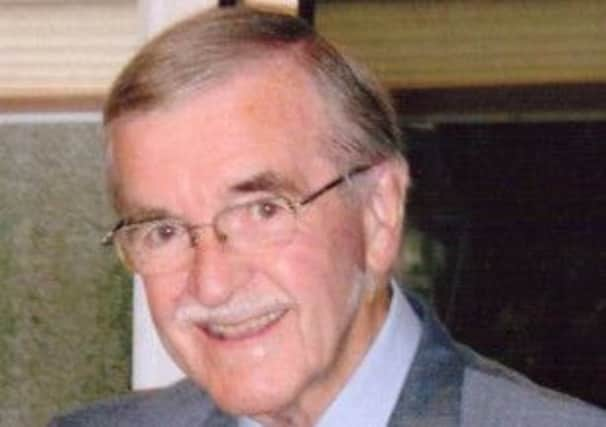Obituary: Norman Wright, train driver and union official


Even as a teenager Norman Wright had a highly developed sense of justice and a determination to stick to his principles.
Having left school at 14 to begin his working life in a bookseller’s business, earning just eight shillings a week, he managed to secure a 50 per cent hike in wages by moving to a printing firm to be a message boy. Despite the job specification, he was trained on, and frequently found himself operating, the printing machines.
Advertisement
Hide AdAdvertisement
Hide AdConsequently, considering himself worthy of more than 12 shillings, he requested an additional shilling – the equivalent of 5p today – in recognition of the extra responsibility. Turned down by the boss for what he believed was a justifiable increase, he gave a week’s notice and quit – demonstrating early on his ability to stick to his guns.
Those principles stayed with him throughout his subsequent career on the railways and in community life as he took up the cause for a wide range of bodies and individuals from colleagues to commuters, the NHS, the Labour Party and Aberdeen Trades Council.
His commitment to fellow workers was honoured when he was elected chairman of the national conference of his union Aslef in its centenary year.
Born and raised in Aberdeen, he was educated at the city’s Kittybrewster and Sunnybank schools before joining A & R Milne Booksellers in Union Street. He was also an accomplished footballer and, after leaving his next job at printers and lithographers Taylor & Henderson, he spent two seasons playing for the juvenile football club North End FC. He also signed for Banks O’ Dee FC in Aberdeen.
On the eve of the Second World War he joined the railway company London and North Eastern Railway (LNER) as an engine cleaner in Aberdeen, later being transferred to Boat of Garten. He tried to enlist after war broke out but was refused as he was in a reserved occupation.
In 1940 he was posted briefly to York to work as a loco fireman, returning to Aberdeen and then Fraserburgh. On arrival at the port, which was being targeted in German air raids, he discovered that the engine shed had not been blacked out and refused to work until it was.
He joined the Associated Society of Locomotive Engineers and Firemen (Aslef) that year, returned to Aberdeen and developed a keen interest in conditions of service, boosting his knowledge of union activities through various courses.
In 1944 he was elected assistant secretary of his local branch and his interest in labour relations work intensified.
Advertisement
Hide AdAdvertisement
Hide AdThree years later he qualified as a steam engine driver and became branch chairman at Kittybrewster depot. After it closed, with the transfer of most staff to the city’s Ferryhill depot, he became chairman of the two amalgamated branches, a position he held until retiring in 1984.
British Rail only came into existence with nationalisation in 1948 and, although initially welcoming the move, he later became disenchanted. He witnessed the savagery of the Beeching plan in the 1960s, which led to wholesale closures of lines and stations, a move he believed “destroyed railways for many years”.
During the 1970s, as the oil industry developed in the north-east and new homes sprang up in the hinterland, he identified the need for a commuter rail service between Aberdeen and the surrounding communities of Inverurie, Stonehaven, Ellon and Dyce. He drafted a plan including timetables, traction to be used and staff required. It was submitted to British Rail and the then local authority, Grampian Regional Council, but, despite many meetings, nothing happened for years. Eventually he succeeded in introducing a commuter link from Dyce to Aberdeen but, as he noted: “The congestion on the roads around Aberdeen gets worse and worse.”
Wright, who was an eloquent, intelligent voice, not only fought his own corner but stood up for the rights of others, in many walks of life, who were less able to express themselves.
He attended national Aslef conferences throughout the UK and abroad, including a delegation to Russia, with his contribution recognised by his appointment as chairman of the 1980 conference in Sheffield celebrating 100 years of the union.
And in tandem with his trade union duties, both locally and nationally, he served on Aberdeen Local Health Council, becoming chairman in 1978, and on the local Industrial Tribunal, roles in which he found a great deal of satisfaction.
He also chaired a group undertaking a study of the NHS but was frustrated to see their findings, some of which were critical, not acted upon. They had interviewed a range of health personnel – consultants, doctors and ancillary staff – and identified cracks appearing in the system which he was dismayed to see continued to widen.
He was also chairman of the Labour Party’s Mastrick branch in Aberdeen and a member of the executive and vice-president for many years of Aberdeen’s Trades Council. Away from public life he was a keen gardener and bowler, loved old architecture, particularly old church buildings, and current affairs.
Advertisement
Hide AdAdvertisement
Hide AdHe enjoyed a long and happy partnership with his wife Nan, and they celebrated their 70th wedding anniversary last year. She survives him along with their son Bill, daughter Norma and three grandchildren.